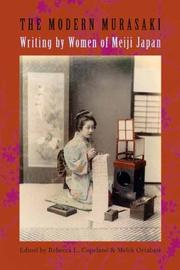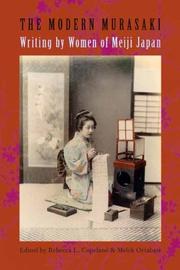| Listing 1 - 6 of 6 |
Sort by
|
Book
ISBN: 9780674492004 0674492005 9781684175383 1684175380 Year: 2014 Publisher: Boston : Leiden; Boston : Harvard University Asia Center BRILL
Abstract | Keywords | Export | Availability | Bookmark
 Loading...
Loading...Choose an application
- Reference Manager
- EndNote
- RefWorks (Direct export to RefWorks)
"Yanagita Kunio (1875-1962) was a public intellectual who played a pivotal role in shaping modern Japan's cultural identity. A self-taught folk scholar and elite bureaucrat, he promoted folk studies in Japan. So extensive was his role that he has been compared with the fabled Grimm Brothers of Germany and the great British folklorist James G. Frazer (1854-1941), author of The Golden Bough. This monograph is only the second book-length English-language examination of Yanagita, and it is the first analysis that moves beyond a biographical account of his pioneering work in folk studies. An eccentric but insightful critic of Japan's rush to modernize, Yanagita offers a compelling array of rebuttals to mainstream social and political trends in his carefully crafted writings. Through a close reading of Yanagita's interdisciplinary texts, which comment on a wide range of key cultural issues that characterized the first half of Japan's twentieth century, Melek Ortabasi seeks to reevaluate the historical significance of his work. Ortabasi's inquiry simultaneously exposes, discursively, some of the fundamental assumptions we embrace about modernity and national identity in Japan and elsewhere."--Amazon.

ISBN: 9780231137744 9780231137751 Year: 2006 Publisher: New York Columbia University Press
Abstract | Keywords | Export | Availability | Bookmark
 Loading...
Loading...Choose an application
- Reference Manager
- EndNote
- RefWorks (Direct export to RefWorks)
The first anthology of its kind, The Modern Murasaki brings the vibrancy and rich imagination of women's writing from the Meiji period to English-language readers. Along with traditional prose, the editors have chosen and carefully translated short stories, plays, poetry, speeches, essays, and personal journal entries. Selected readings include writings by the public speaker Kishida Toshiko, the dramatist Hasegawa Shigure, the short-fiction writer Shimizu Shikin, the political writer Tamura Toshiko, and the novelists Miyake Kaho, Higuchi Ichiyo, Tazawa Inabune, Kitada Usurai, Nogami Yaeko, and Mizuno Senko. The volume also includes a thorough introduction to each reading, an extensive index listing historical, social, and literary concepts, and a comprehensive guide to further research. The fierce tenor and bold content of these texts refute the popular belief that women of this era were passive and silent. A vital addition to courses in women's studies and Japanese literature and history, The Modern Murasaki is a singular resource for students and scholars. -- Publisher.

ISBN: 0231137745 0231137753 0231510667 Year: 2006 Publisher: Columbia University Press
Abstract | Keywords | Export | Availability | Bookmark
 Loading...
Loading...Choose an application
- Reference Manager
- EndNote
- RefWorks (Direct export to RefWorks)
The first anthology of its kind, The Modern Murasaki brings the vibrancy and rich imagination of women's writing from the Meiji period to English-language readers. Along with traditional prose, the editors have chosen and carefully translated short stories, plays, poetry, speeches, essays, and personal journal entries. Selected readings include writings by the public speaker Kishida Toshiko, the dramatist Hasegawa Shigure, the short-fiction writer Shimizu Shikin, the political writer Tamura Toshiko, and the novelists Miyake Kaho, Higuchi Ichiyo, Tazawa Inabune, Kitada Usurai, Nogami Yaeko, and Mizuno Senko. The volume also includes a thorough introduction to each reading, an extensive index listing historical, social, and literary concepts, and a comprehensive guide to further research. The fierce tenor and bold content of these texts refute the popular belief that women of this era were passive and silent. A vital addition to courses in women's studies and Japanese literature and history, The Modern Murasaki is a singular resource for students and scholars.
Japanese literature --- Women authors --- Translations into English --- Women authors.
Book

ISBN: 152974847X Year: 2020 Publisher: London : SAGE Publications Ltd.,
Abstract | Keywords | Export | Availability | Bookmark
 Loading...
Loading...Choose an application
- Reference Manager
- EndNote
- RefWorks (Direct export to RefWorks)
Yanagita Kunio (1875-1962) is generally regarded as the founder of modern folk studies (minzokugaku) in Japan (note that this entry follows the Japanese convention of listing the surname [family name] first, followed by the given name). However, a brief glance at his life reveals the diverse scholarly contributions made by this ambitious son of Japan's Meiji period (1868-1912). A socially engaged intellectual, he came of age in a Japan that had only recently adopted a parliamentary government and was in the midst of wide-ranging efforts to modernizeand Westernizeeverything from politics and industry to culture and society. Driven by what he saw as Japan's modern crisis of identity, Yanagita became a self-made scholar who took a culturally focused, interdisciplinary attitude to solving that problem.
Book

ISBN: 9780231510660 Year: 2006 Publisher: New York, NY
Abstract | Keywords | Export | Availability | Bookmark
 Loading...
Loading...Choose an application
- Reference Manager
- EndNote
- RefWorks (Direct export to RefWorks)


ISBN: 9780231510660 9780231137751 Year: 2006 Publisher: New York, N.Y. Columbia University Press
Abstract | Keywords | Export | Availability | Bookmark
 Loading...
Loading...Choose an application
- Reference Manager
- EndNote
- RefWorks (Direct export to RefWorks)
| Listing 1 - 6 of 6 |
Sort by
|

 Search
Search Feedback
Feedback About UniCat
About UniCat  Help
Help News
News